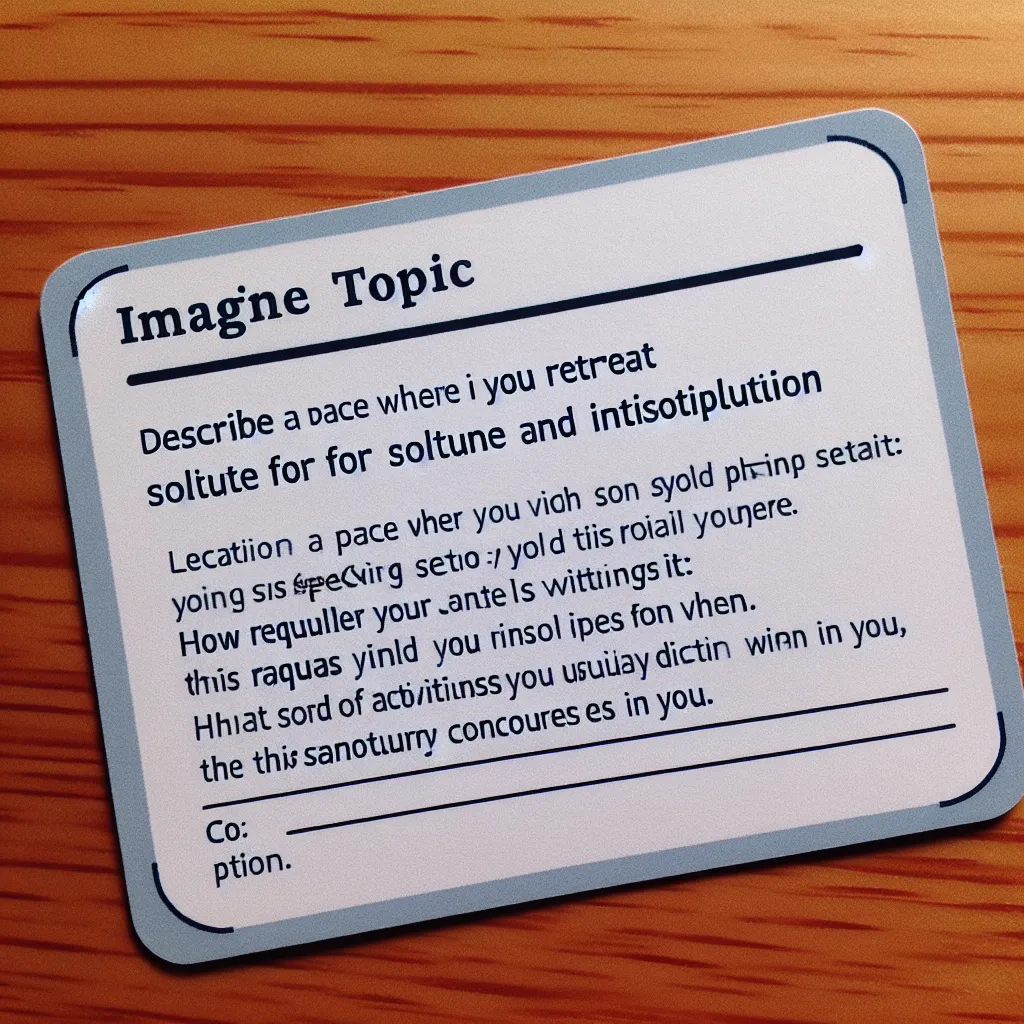Are you preparing for the IELTS Speaking test and wondering how to tackle questions about personal spaces and reflective moments? In this comprehensive guide, we’ll explore the topic “Describe a place where you go to be alone with your thoughts” – a common theme in IELTS Speaking exams. We’ll provide you with valuable insights, sample answers, and expert tips to help you excel in your IELTS Speaking test.
Nội dung bài viết
Understanding the IELTS Speaking Test Structure
Before we dive into the specific topic, let’s briefly review the structure of the IELTS Speaking test:
- Part 1: Introduction and Interview (4-5 minutes)
- Part 2: Individual Long Turn (3-4 minutes)
- Part 3: Two-way Discussion (4-5 minutes)
Now, let’s explore how the topic “Describe a place where you go to be alone with your thoughts” might appear in each part of the test.
Part 1: Introduction and Interview
In this section, the examiner may ask you general questions about your daily life, including your habits and preferences. Here are some potential questions related to our topic:
- Do you enjoy spending time alone?
- How often do you take time to be by yourself?
- Where do you usually go when you want to be alone?
Let’s look at a sample answer for the third question:
Examiner: Where do you usually go when you want to be alone?
Sample Answer (Band 7-8):
“Well, when I need some alone time, I typically head to a small park near my home. It’s a tranquil spot with beautiful trees and a small pond. I find that being in nature really helps me clear my mind and reflect on things.”
Key phrases: typically, tranquil, clear my mind, reflect
Part 2: Individual Long Turn
In this section, you’ll be given a cue card with a topic and some bullet points. You’ll have one minute to prepare, then you’ll need to speak for 1-2 minutes on the topic. Here’s a sample cue card related to our theme:
 IELTS Speaking Cue Card
IELTS Speaking Cue Card
Describe a place where you go to be alone with your thoughts
You should say:
• Where this place is
• How often you go there
• What you do there
• And explain why you like to go there to be alone with your thoughts
Now, let’s look at two sample answers – one for Band 6-7 and another for Band 8-9:
Sample Answer (Band 6-7):
“The place I’d like to talk about is a small coffee shop in my neighborhood. It’s a cozy little place with comfortable chairs and soft background music. I try to go there at least once a week, usually on weekend mornings when it’s not too busy.
When I’m there, I usually order a cup of coffee and find a quiet corner to sit in. I often bring a book or my journal with me. Sometimes I read, but more often, I just sit and think about things that are happening in my life.
I really like going to this coffee shop because it gives me a chance to get away from the noise and distractions of my everyday life. The atmosphere is calm and peaceful, which helps me clear my mind and think more deeply about important decisions or problems I’m facing. It’s also a nice change of scenery from my home or office, which I find helps me gain new perspectives on things.
Overall, this coffee shop has become my go-to spot for some quiet reflection time, and I always feel more relaxed and focused after spending an hour or two there.”
Sample Answer (Band 8-9):
“I’d like to describe a rather unconventional spot that I frequent when I need to be alone with my thoughts – it’s an old, abandoned lighthouse on the outskirts of my city. This majestic structure stands on a rocky outcrop overlooking the sea, offering a panoramic view of the coastline.
I make it a point to visit this secluded sanctuary at least twice a month, often timing my visits with the sunset or during early mornings when the first light bathes the landscape in a soft, golden glow. The journey to the lighthouse itself is part of the experience, involving a short hike that helps me transition mentally from the bustle of daily life to a more contemplative state.
Once there, I engage in various activities that foster introspection. Sometimes I simply sit on the rocks, letting the rhythmic sound of the waves wash over me as I meditate. Other times, I bring along a notebook and jot down my thoughts, often finding that the act of writing helps me untangle complex emotions or crystallize ideas that have been floating in my subconscious.
The reason I’m drawn to this particular spot for solitary reflection is multifaceted. Firstly, the sheer beauty of the location serves as a powerful reminder of the vastness of nature, which often helps me put my own concerns into perspective. The isolation of the lighthouse also ensures that I won’t be disturbed, allowing me to delve deep into my thoughts without interruption.
Moreover, there’s something inherently symbolic about a lighthouse – a beacon of hope and guidance – that resonates with me when I’m grappling with difficult decisions or seeking clarity in my life. The juxtaposition of the old, weathered structure against the ever-changing sea and sky also serves as a poignant metaphor for the constancy and flux in our own lives.
In essence, this lighthouse has become my personal refuge – a place where I can reconnect with myself, gain insights, and recharge my mental batteries. Each visit leaves me feeling grounded, reinvigorated, and better equipped to face the challenges that await me back in the bustling world below.”
Key phrases: unconventional, majestic structure, panoramic view, secluded sanctuary, bathes the landscape, soft golden glow, transition mentally, contemplative state, foster introspection, rhythmic sound of the waves, meditate, untangle complex emotions, crystallize ideas, powerful reminder, put my own concerns into perspective, delve deep into my thoughts, seeking clarity, juxtaposition, poignant metaphor, refuge, reconnect with myself, recharge my mental batteries
After your long turn, the examiner might ask you one or two follow-up questions. For example:
- Do you think it’s important for people to have a place where they can be alone?
- How has having this special place affected your life?
Part 3: Two-way Discussion
In this part, the examiner will ask you more abstract questions related to the topic. Here are some potential questions and sample answers:
Examiner: Do you think modern life makes it difficult for people to find time to be alone with their thoughts?
Sample Answer (Band 6-7):
“Yes, I think modern life does make it hard for people to find alone time. We’re always connected to our phones and computers, and there’s always something demanding our attention. It’s easy to get caught up in work or social media and forget to take time for ourselves. I think many people struggle to switch off and just be with their thoughts.”
Sample Answer (Band 8-9):
“Absolutely, I believe the frenetic pace of modern life poses significant challenges for individuals seeking solitude and introspection. The ubiquity of technology and the constant barrage of information we face daily can create a sort of mental clutter that’s difficult to escape. Social media, in particular, has conditioned many of us to constantly seek external validation and stimulation, making it challenging to turn inward and engage in deep, reflective thought. Moreover, the blurring of boundaries between work and personal life, exacerbated by remote work trends, often leaves people feeling like they’re perpetually ‘on call’. This continuous state of alertness can make it extremely difficult to carve out the mental and physical space necessary for meaningful self-reflection. However, I also believe that recognizing this challenge is the first step towards addressing it, and many people are now actively seeking ways to disconnect and reclaim their inner mental space.”
Key phrases: ubiquity of technology, barrage of information, mental clutter, constantly seek external validation and stimulation, blurring of boundaries, perpetually ‘on call’, carve out, disconnect, reclaim their inner mental space
Examiner: How do you think the ability to be alone with one’s thoughts contributes to personal growth?
Sample Answer (Band 6-7):
“I think being alone with your thoughts is really important for personal growth. It gives you time to think deeply about your life and your goals. When you’re always busy, you might not notice problems or opportunities. But when you take time to be alone and think, you can figure out what’s really important to you and make better decisions.”
Sample Answer (Band 8-9):
“The capacity for solitary reflection is, in my opinion, integral to personal development. When we allow ourselves the space to be alone with our thoughts, we create opportunities for deep introspection and self-discovery. This quiet time enables us to process our experiences, analyze our behaviors, and gain insights into our motivations and desires. It’s during these moments of solitude that we often experience paradigm shifts or epiphanies that can significantly alter our life’s trajectory. Moreover, regular periods of reflection foster emotional intelligence and self-awareness, crucial skills for navigating complex interpersonal relationships and professional challenges. By stepping back from the cacophony of daily life, we can gain perspective on our problems, identify patterns in our thinking and behavior, and cultivate a sense of inner peace that bolsters our resilience in the face of adversity. Ultimately, I believe that the ability to be comfortable with one’s own thoughts is a hallmark of emotional maturity and a catalyst for continuous personal growth.”
Key phrases: integral to personal development, deep introspection, self-discovery, process our experiences, analyze our behaviors, gain insights, paradigm shifts, epiphanies, emotional intelligence, self-awareness, stepping back, gain perspective, cultivate a sense of inner peace, hallmark of emotional maturity, catalyst for continuous personal growth
Essential Vocabulary and Phrases for High Scores
To achieve a high score in your IELTS Speaking test, it’s crucial to use a range of sophisticated vocabulary and phrases. Here are some key terms related to our topic:
-
Solitude (noun) /ˈsɒlɪtjuːd/ – the state or situation of being alone
Example: “I often seek solitude in nature to clear my mind.” -
Introspection (noun) /ˌɪntrəˈspekʃən/ – the examination or observation of one’s own mental and emotional processes
Example: “Regular introspection helps me understand myself better.” -
Contemplative (adjective) /kənˈtempleɪtɪv/ – involving deep thought
Example: “The quiet garden provides a contemplative atmosphere.” -
Sanctuary (noun) /ˈsæŋktʃuəri/ – a place of refuge or safety
Example: “This little corner of the library is my sanctuary from the busy world.” -
Recharge (verb) /riːˈtʃɑːdʒ/ – regain energy and spirit
Example: “I go to the beach to recharge my mental batteries.” -
Reflect (verb) /rɪˈflekt/ – think deeply or carefully about
Example: “I like to reflect on my goals and progress regularly.” -
Mindfulness (noun) /ˈmaɪndfʊlnəs/ – the quality or state of being conscious or aware of something
Example: “Practicing mindfulness helps me stay focused on the present moment.”
Tips from an IELTS Examiner
As an experienced IELTS examiner, here are my top tips for excelling in the Speaking test:
-
Practice regularly: Set aside time each day to speak English, even if it’s just talking to yourself.
-
Expand your vocabulary: Learn new words and phrases related to common IELTS topics and use them in context.
-
Use a variety of grammatical structures: Don’t stick to simple sentences. Practice using complex and compound sentences.
-
Develop your ideas: Don’t just give short answers. Explain your thoughts and provide examples to support your points.
-
Work on your pronunciation: Pay attention to word stress and intonation. Listen to native speakers and try to mimic their speech patterns.
-
Stay calm and confident: Remember, the examiner is there to assess your English, not to trick you. Breathe deeply and speak clearly.
-
Be authentic: While it’s good to prepare, don’t memorize answers. The examiner can tell, and it will lower your score.
By following these tips and practicing regularly, you’ll be well-prepared to tackle any topic in your IELTS Speaking test, including describing a place where you go to be alone with your thoughts.
Remember, the key to success in the IELTS Speaking test is not just about knowing the language, but also about expressing your ideas clearly and confidently. Good luck with your preparation!


